Whole black peppercorns retain more flavor and last longer than pre-ground pepper. For the best culinary results, choose the right size based on your cooking needs: whole peppercorns (3-5mm) for freshness, coarse ground (1-2mm) for rubs and grilling, fine ground (<1mm) for everyday seasoning, and cracked pepper for garnishing. This guide explains how black pepper size affects flavor intensity, shelf life, and cooking applications.
Table of Contents
- Why Does Black Pepper Size Matter?
- Black Pepper Sizes Explained
- Whole Peppercorns vs. Ground Pepper: The Flavor Factor
- Visual Comparison Table: Sizes at a Glance
- How to Store Black Pepper by Size
- When to Use Each Size: Practical Tips
- Buying Guide: Choosing the Right Black Pepper Size
- Frequently Asked Questions About Black Pepper Size
- Final Thoughts: Cracking the Black Pepper Size Puzzle
Why Does Black Pepper Size Matter?
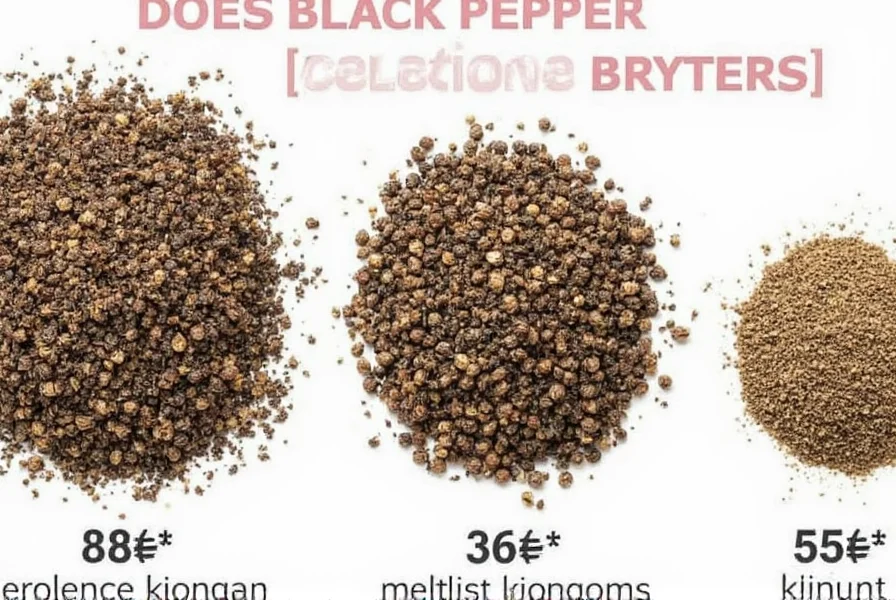
Black pepper size significantly impacts flavor intensity and shelf life. Whole peppercorns retain essential oils for up to 4 years, while ground pepper loses potency within months. Understanding the black pepper size spectrum helps you decide what's best for your pantry and palate.
Black Pepper Sizes Explained
Here's a breakdown of common black pepper sizes you'll encounter in stores:
- Whole Peppercorns: Typically range from 3–5 mm in diameter. They're ideal for grinding fresh or infusing into sauces, soups, and stews.
- Coarsely Ground: Around 1–2 mm in particle size. Offers texture and bold flavor. Great for rubs and marinades.
- Fine Ground: Less than 1 mm. The most common type found in shakers. Best for general seasoning where subtlety is key.
- Cracked Pepper: A mix of broken pieces and coarse grains. Adds visual appeal and bite to dishes like steak or creamy pastas.
| Type | Size Range | Best For | Shelf Life |
|---|---|---|---|
| Whole Peppercorns | 3–5 mm | Grinding fresh, infusion | 3–4 years |
| Coarse Ground | 1–2 mm | Rubs, grilled meats | 6–12 months |
| Fine Ground | <1 mm | Everyday cooking, seasoning | 3–6 months |
| Cracked Pepper | Mixed (mostly 1–3 mm) | Steak, pasta, sauces | 8–12 months |
Whole Peppercorns vs. Ground Pepper: The Flavor Factor
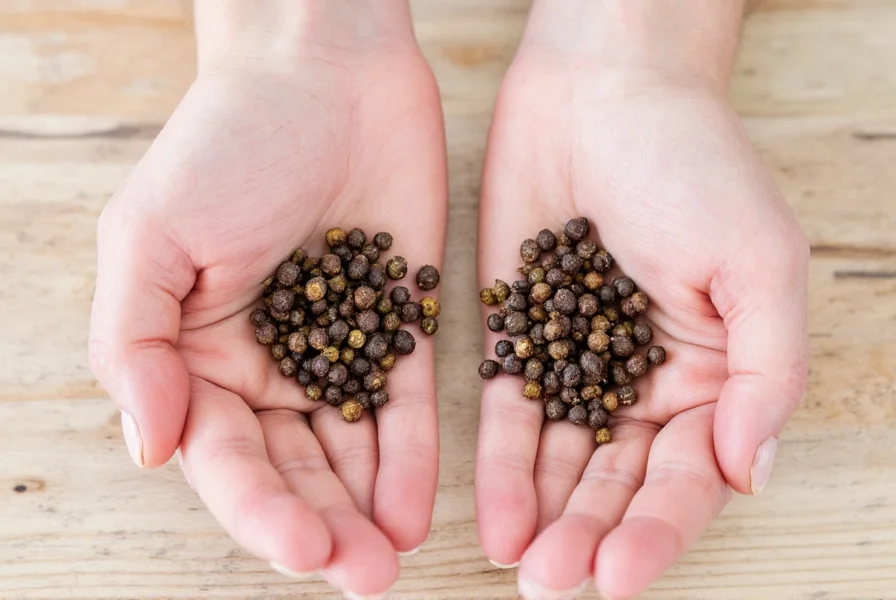
One of the biggest debates in spice circles is whether to grind your own or buy pre-ground. The answer often lies in flavor retention. Whole peppercorns have their essential oils locked inside, preserving freshness until the moment you crack them open. Ground pepper, while convenient, starts to lose aroma almost immediately after grinding.
To test this yourself, try this simple experiment:
- Smell a freshly cracked peppercorn versus a bottle of store-bought ground pepper.
- You'll notice that the whole grain has a sharper, more aromatic scent compared to the duller smell of pre-ground.
Visual Comparison Table: Sizes at a Glance
| Form | Appearance | Flavor Intensity | Use Case |
|---|---|---|---|
| Whole Peppercorns | Dark brown, round, glossy | High | Infusions, grinding fresh |
| Coarse Ground | Chunky bits | Medium-high | Rubs, grilling |
| Fine Ground | Powdery consistency | Medium | Sauces, dressings, baked goods |
| Cracked Pepper | Mixed texture with visible pieces | High-medium | Top garnish, gourmet dishes |
How to Store Black Pepper by Size
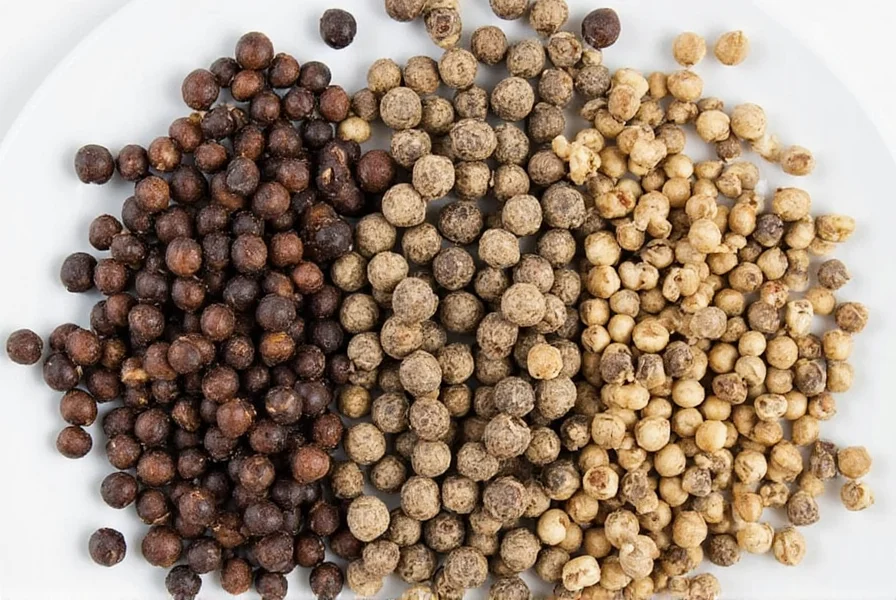
Proper storage depends heavily on the black pepper size. Here's how to keep each type tasting fresh:
- Whole Peppercorns: Keep in an airtight container away from light and heat. Can last up to four years without losing potency.
- Coarse Ground: Stored properly, it retains flavor for up to a year. Use a dark glass jar if possible.
- Fine Ground: Loses flavor fastest. Best kept in small quantities and used within six months.
- Cracked Pepper: Falls between whole and ground in terms of longevity. Store like coarse ground pepper.
When to Use Each Size: Practical Tips
Choosing the right size isn't just about preference — it's about function. Here are some real-world examples:
- Cooking Steak? Use coarsely cracked or coarse ground pepper for maximum impact and texture — this is the best pepper for steak.
- Seasoning Soups or Stews? Whole peppercorns add depth when simmered and can be strained out later.
- Whipping Up a Cream Sauce? Fine ground pepper blends in seamlessly without gritty texture.
- Baking Savory Breads? Coarse ground adds a subtle crunch and aromatic bite.
- Garnishing a Dish? Cracked pepper makes a beautiful and flavorful topping.
Buying Guide: Choosing the Right Black Pepper Size
When shopping for black pepper, consider these factors based on your cooking style and frequency of use:
1. Whole Peppercorns – Best for Freshness Lovers
- Features: Retains essential oils and aroma longer than any other form.
- Advantages: Versatile, long shelf life, premium feel.
- Use Cases: Ideal for those who use pepper frequently and prefer to grind as needed.
- Target Audience: Home cooks, professional chefs, spice connoisseurs.
- Recommended Occasions: Everyday use, gourmet recipes, holiday meals.
2. Coarse Ground Pepper – Perfect for Grilling & Rubs
- Features: Larger particles with bold flavor release.
- Advantages: Easy to sprinkle, holds flavor well.
- Use Cases: BBQs, grilled meats, homemade spice blends.
- Target Audience: Grill enthusiasts, adventurous home cooks.
- Recommended Occasions: Summer cookouts, dinner parties, specialty dishes.
3. Fine Ground Pepper – The Everyday Staple
- Features: Powder-like consistency, quick dispersal.
- Advantages: Instant seasoning, easy to blend into sauces and batters.
- Use Cases: Baking, sauces, dressings, everyday table use.
- Target Audience: Casual cooks, families, busy professionals.
- Recommended Occasions: Weeknight dinners, packed lunches, school lunches.
4. Cracked Pepper – The Gourmet Touch
- Features: Visually appealing with mixed textures.
- Advantages: Enhances presentation and adds complexity to flavor.
- Use Cases: Garnishing steaks, adding to creamy pastas, finishing salads.
- Target Audience: Foodies, restaurant chefs, culinary creatives.
- Recommended Occasions: Dinner dates, dinner parties, photo-worthy plating.
Frequently Asked Questions About Black Pepper Size
What's the difference between whole peppercorns and ground pepper?
Whole peppercorns are intact dried berries (3-5 mm in diameter) that retain their essential oils and flavor longer. Ground pepper has already been processed into fine or coarse particles, making it more convenient but less flavorful over time as the volatile compounds evaporate.
Does black pepper size affect flavor intensity?
Yes, significantly. Whole peppercorns preserve the most flavor compounds. When freshly ground, they release maximum aroma and heat. Finer grinds lose potency faster but distribute more evenly in dishes. Coarse grinds provide bursts of flavor and texture.
How long does each type of black pepper last?
Whole peppercorns maintain freshness for 3-4 years when stored properly. Coarsely ground pepper lasts 6-12 months, cracked pepper 8-12 months, and fine ground pepper only 3-6 months before noticeable flavor degradation occurs.
What size pepper is best for steak?
Coarsely cracked or coarse ground pepper works best for steak, creating a flavorful crust when seared. The larger particles provide texture and don't burn as easily as fine pepper during high-heat cooking.
Can I substitute one pepper size for another in recipes?
You can substitute, but with considerations. Use about 1/2 to 2/3 the amount of pre-ground pepper when replacing whole peppercorns (since ground is more concentrated). For coarsely ground to fine ground substitutions, use equal amounts but expect different texture and flavor release.
Why is freshly ground pepper better than pre-ground?
Freshly ground pepper retains volatile oils that give pepper its distinctive aroma and heat. These compounds begin evaporating immediately after grinding, so pre-ground pepper loses up to 50% of its flavor within an hour of processing.
How should I store different pepper sizes for maximum freshness?
Store all pepper types in airtight containers away from light and heat. Whole peppercorns are most stable. Ground pepper benefits from dark glass containers and should be purchased in smaller quantities since it degrades faster. Never store pepper in the refrigerator, as moisture accelerates flavor loss.
What's the standard size of black peppercorns?
Standard black peppercorns typically range from 3-5 mm in diameter. Premium Tellicherry peppercorns are larger (4-5 mm) and considered higher quality, while smaller Malaysian peppercorns are often 3-4 mm.
Is there a difference between cracked pepper and coarsely ground pepper?
Yes. Cracked pepper consists of intentionally broken pieces with varying sizes (1-3 mm), preserving some whole peppercorn characteristics. Coarsely ground pepper has more uniform particle size (1-2 mm) from consistent grinding. Cracked pepper offers more visual appeal and texture variation.
What size black pepper should I use for baking?
For most baked goods, fine ground pepper is best as it distributes evenly without creating bitter hot spots. However, for artisan breads or specialty baked items where pepper is a featured ingredient, coarsely ground pepper adds desirable texture and flavor bursts.
Final Thoughts: Cracking the Black Pepper Size Puzzle
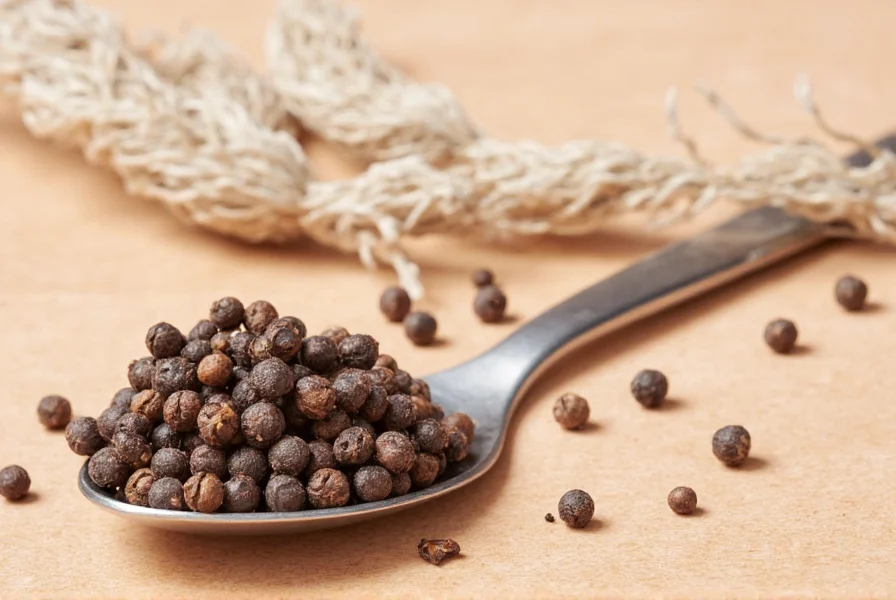
The next time you reach for that little shaker or a jar of peppercorns, take a second to think about what kind of experience you want from your pepper. Do you crave that burst of sharp aroma from freshly crushed whole peppercorns? Or do you need something that blends in smoothly and evenly? Understanding black pepper size gives you more control over flavor, texture, and even cost-effectiveness in the kitchen.
Whether you're a purist who swears by a manual mill or someone who values convenience, there's a perfect black pepper size out there for you. Now go ahead — spice things up!

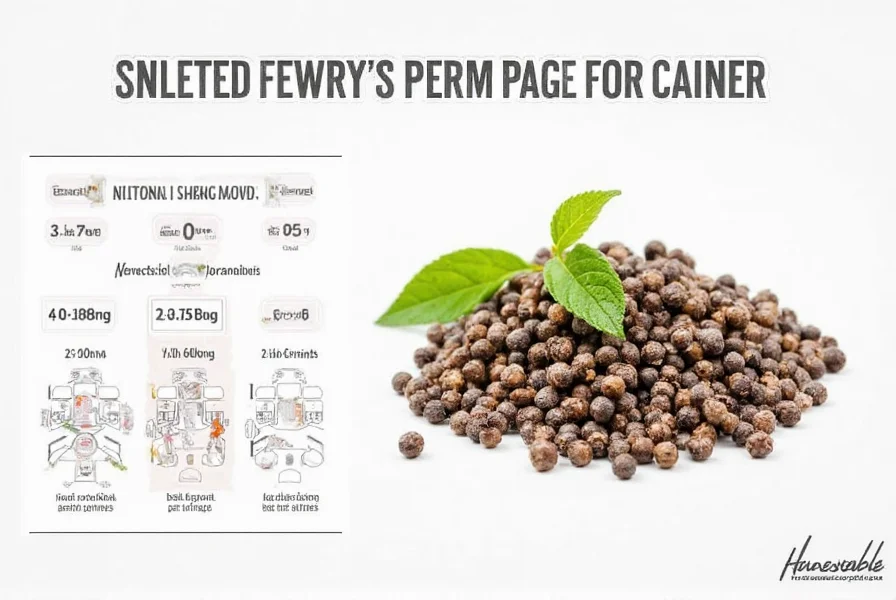









 浙公网安备
33010002000092号
浙公网安备
33010002000092号 浙B2-20120091-4
浙B2-20120091-4